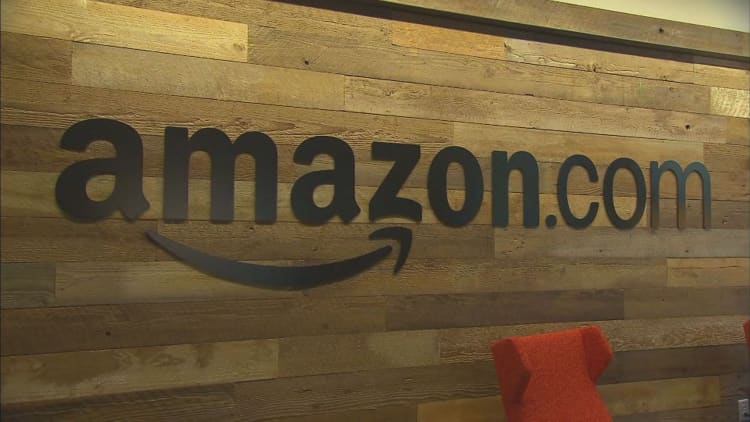
Wall Street will eye Amazon earnings Thursday for hints of which investment will yield Amazon's next gold mine, analysts told CNBC.
"If there's some golden goose that proves the investment strategy is worthwhile — whether that's content, fulfillment, Prime membership, better same-day delivery capabilities — any of those will be borne out as positives for Amazon," said Daniel Kurnos, internet, media and communications analyst at the Benchmark Co.
Amazon is slated to report first-quarter earnings Thursday afternoon. Analysts expect earnings of 58 cents per share on revenues of $27.98 billion, according to Thomson Reuters consensus estimates.
In advance of the report, Amazon's share price was up 2.7 percent Thursday morning. Shares of Amazon are up nearly 40 percent over the past year.
After several quarters of steady profit, the costs of a high-volume holiday season weighed on fourth-quarter earnings. As "Prime Day" and Christmas fade into the background, analysts said they will look for how costly investments are progressing in Amazon's key segments, like premium subscriptions, logistics and cloud computing.
Amazon's story is the "simplest it has been in years," Macquarie Capital Research analyst Ben Schachter wrote.
Last quarter, Amazon Prime membership increased 51 percent year over year, Chief Financial Officer Brian Olsavsky said in an earnings call. Prime membership has long been a focus for Wall Street as it is thought to lead to a "flywheel effect" that fosters loyalty and thus consumer spending.
Prime faces a critical juncture, as earnings reveal whether the premium service is near its peak or has potential to keep adding customers through Prime-only discounts like new video games, Schachter wrote.
The company recently announced cheaper Prime products that could appeal to a wider audience, like a standalone video-streaming subscription, and a monthly add-on plan through Sprint. Amazon has also made headlines for its distribution of Prime same-day delivery, which was less widely available in low-income, predominantly black communities, according to Bloomberg.
"We believe that perhaps the single-most important question for Prime over the next few years will be how does Amazon attract lower-income households," Schachter wrote in a research note.
Meanwhile, Amazon has been expanding its regular retail delivery service, investing in more resources in the U.S. and upping bets abroad as the domestic market becomes saturated, said Jan Dawson, chief analyst at Jackdaw Research. Dawson said he'll look for clues as to whether Amazon will decide to double down on foreign markets where it already has traction or focus on building a more robust customer base in China and India.
"They do the best when they have high density of their infrastructure, like fulfillment structures, and are close enough to customers for groceries or same-day deliveries," Dawson said. "They need a critical mass of orders and customers in a granular level. It's hard to replicate that in big, big markets like China and India, where they have less market share."
Analysts at Pacific Crest Securities and KeyBanc are hoping that in spite of emerging competition, strong profit growth in the cloud computing division Amazon Web Services is able to offset Amazon's spending spree on things like private-label apparel and new Kindles.
"The 10-year ramp from zero to $10 billion has certainly been impressive, but we argue cloud adoption remains still in the early stages, with it accounting for less than 15 percent of overall IT spending annually," wrote Pacific Crest's Edward Yruma. "However, even decelerating growth rates of 40 percent to 50 percent later this year still represent some of the best growth in all of technology."
Michael Pachter of Wedbush Securities said he expects AWS to grow 50 percent for at least the rest of the year, but he's not betting that will translate into anything more than modest earnings growth.
"I think what most of us disregard is that Amazon is never going to run out of new things to spend money on," said Pachter. "We're seeing big advertising campaigns for things like Echo ... You're going to see things like expanded grocery delivery, restaurant delivery, they're going to try and take on the GrubHubs of the world. That stuff costs money."




